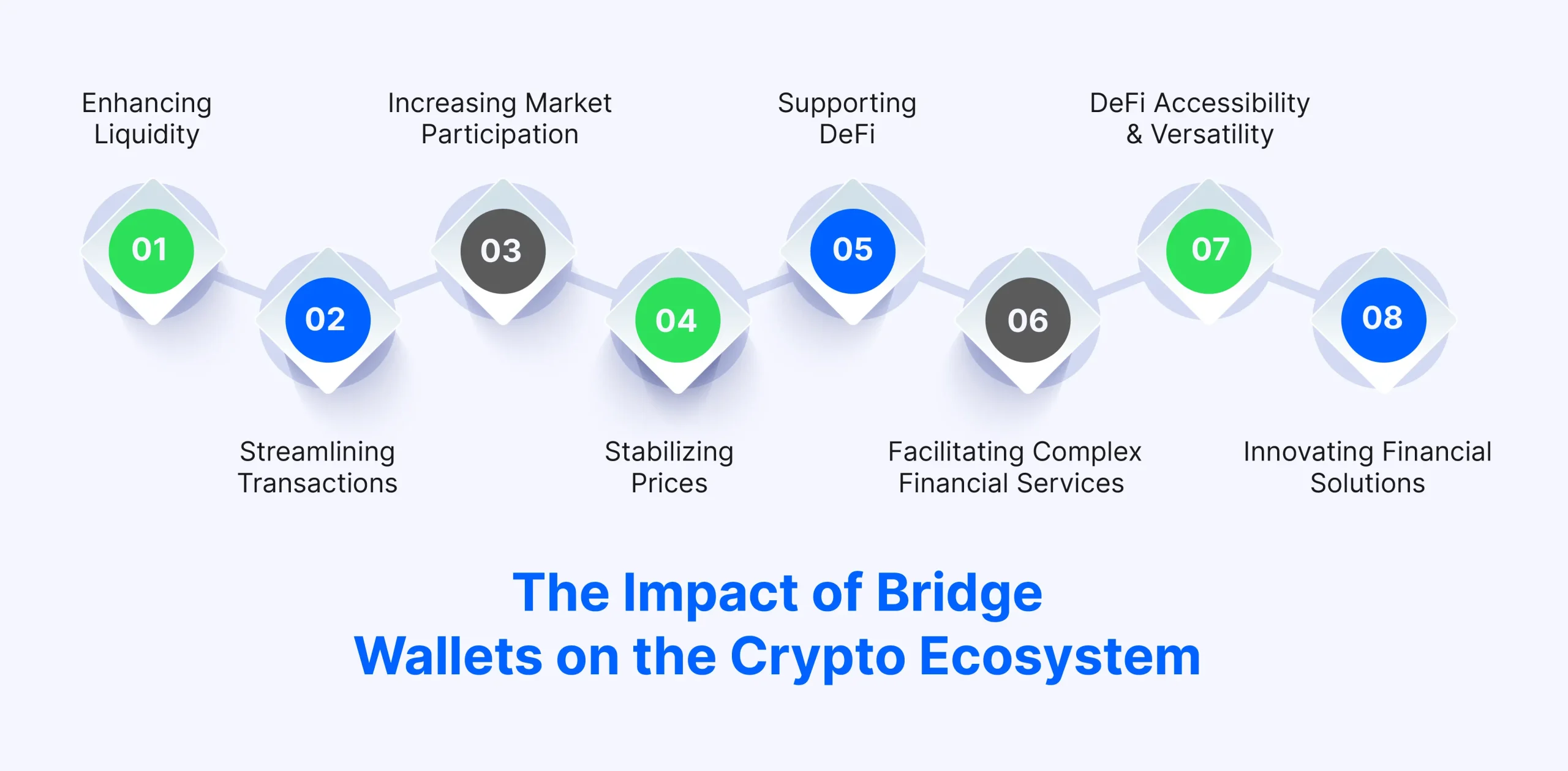
Introduction
Web3 & Blockchain Consultancy :
Bridge Wallets – Facilitating Smooth Crypto Transfers Across Blockchains
One of the most groundbreaking advancements in the digital domain is the development of blockchain technology. Although it was created for Bitcoin, blockchain has become a fundamental part of many digital transactions. Yet, a major challenge it faces is the inability to work smoothly between different blockchains, creating a divided system where assets and data are trapped within separate networks. Bridge wallets are innovative tools that address this issue by linking these disconnected blockchains together. They allow for smooth and efficient exchanges across various blockchain platforms.Key Takeaways
- What are Bridge Wallets? Bridge wallets are advanced digital platforms that enable seamless transactions across different blockchain networks, breaking down barriers and enhancing interoperability in the crypto domain.
- Features of Bridge Wallets: Key features of bridge wallets include cross-chain swaps, user-friendly interfaces, enhanced security measures like two-factor authentication, and support for a wide range of cryptocurrencies.
- Impact on the Crypto Ecosystem: Bridge wallets significantly increase liquidity and facilitate the growth of decentralized finance (DeFi) by allowing more complex financial transactions and interactions across multiple blockchains, shaping a more integrated financial future
What are Bridge Wallets?
A bridge wallet is a sophisticated digital platform that serves a critical function in the cryptocurrency space. Unlike traditional digital wallets, which are limited to a single blockchain, bridge wallets are designed to overcome the barriers between different blockchains. They achieve this by utilizing advanced protocols that enable them to interact seamlessly with multiple chains. This capability significantly expands the operational possibilities for users, allowing them to manage, transfer, and exchange assets across a variety of blockchain environments. Essentially, bridge wallets act as connectors that fill the gaps between separate blockchain ecosystems, making them integral to the fluid movement of digital assets in a fragmented landscape.What is Bridging in Crypto?
Bridging within the cryptocurrency realm involves facilitating the movement of assets across diverse blockchain networks. This function is crucial for enhancing the interoperability of the blockchain ecosystem, as it enables the transfer of data and assets between various platforms. Without such mechanisms for sharing data, the full potential of blockchain technology could remain untapped. Bridging addresses this limitation by enabling users to transfer assets across different blockchain environments.Key Features of Bridge Wallets
Bridge wallets are equipped with several key features that enhance their functionality and make them powerful tools for cryptocurrency users. These features improve the transactional capabilities of the wallets and address common concerns such as security, usability, and the inclusiveness of various cryptocurrencies.Cross-Chain Swaps
One of the standout features of bridge wallets is their ability to facilitate cross-chain swaps. This feature allows users to exchange one type of cryptocurrency for another across different blockchains directly from their wallet interface, bypassing the need for centralized exchanges. This not only simplifies the transaction process but also enhances user privacy and reduces reliance on potentially vulnerable third-party platforms.User-Friendly Interfaces
Bridge wallets are designed to be accessible to all users, regardless of their experience level with cryptocurrencies. They feature intuitive interfaces that simplify the complexities of blockchain transactions, making it easier for new users to navigate and for experienced users to perform advanced operations efficiently. This approach helps to lower the entry barrier to using cryptocurrencies and encourages wider adoption.Enhanced Security Measures
Security is a paramount feature of bridge wallets. These wallets often include robust security protocols like two-factor authentication, which requires a second form of verification before transactions can be completed, adding an extra layer of protection against unauthorized access. Many bridge wallets also utilize hardware security modules to secure cryptographic keys physically. In some cases, wallet providers offer insurance policies to cover potential losses from breaches, giving users an additional level of financial safety.Support for Multiple Cryptocurrencies
Unlike traditional wallets, bridge wallets are designed to support a wide range of cryptocurrencies. This inclusivity is crucial for users who engage with multiple blockchain platforms. It enables them to manage different types of assets through a single interface, streamlining their investment activities and reducing the need for multiple wallets. These features collectively enhance the utility of bridge wallets, making them indispensable tools for anyone looking to engage deeply with cryptos. By addressing key user concerns such as security, ease of use, and the ability to operate across multiple blockchain platforms, bridge wallets play a crucial role in the ongoing evolution of the cryptocurrency ecosystem.The Technology Behind Bridge Wallets
The backbone of bridge wallets lies in their ability to communicate across chains. Technologies like atomic swaps utilize smart contracts to exchange coins between different blockchains without the need for intermediaries. Another approach involves the creation of wrapped tokens (such as Wrapped Bitcoin on Ethereum), where the original asset is locked in a smart contract and a corresponding token is issued on another blockchain. Additionally, blockchain bridges are crucial, acting as intermediaries that can read, verify, and communicate transactions across blockchains.Security Aspects
Security in bridge wallets is very important. Developers implement robust encryption methods to protect sensitive information. Multi-signature wallets require multiple keys to authorize a single transaction, enhancing security by distributing the permission among multiple entities. Regular security audits are conducted to ensure the integrity of the bridge protocols and safeguard against potential vulnerabilities.The Impact of Bridge Wallets on the Crypto Ecosystem
Bridge wallets have emerged as transformative tools within the cryptocurrency landscape, addressing one of the most persistent challenges: the interoperability of different blockchains. By smoothly connecting these diverse networks, bridge wallets facilitate a more integrated ecosystem, leading to substantial impacts on liquidity and the field of decentralized finance (DeFi). These impacts enhance the functionality and efficiency of transactions while playing a key role in shaping the future dynamics of the crypto market.
By smoothly connecting these diverse networks, bridge wallets facilitate a more integrated ecosystem, leading to substantial impacts on liquidity and the field of decentralized finance (DeFi). These impacts enhance the functionality and efficiency of transactions while playing a key role in shaping the future dynamics of the crypto market.